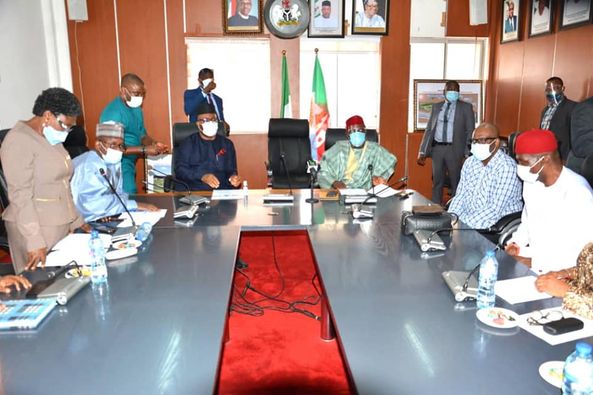More than 114 local government areas in the nine states of the Niger Delta region would be affected by floods between September and October, this year, the Minister of Niger Delta Affairs, Senator Godswill Akpabio has predicted.
Akpabio stated this Wednesday while inaugurating an inter-agency committee to assess and anticipate the impact of flooding and COVID-19 in the Niger Delta region and ensure preparedness for potential displacement and other impacts.
He stressed the importance of planning and anticipating the coming floods particularly in the rainy season.
“Over the years, the Niger Delta region has witnessed varying degrees of environmental challenges that have had tremendous negative impact on not only the psyche of the people of the region, but also of the Nation as a whole.
“One of these environmental challenges that has assumed annual occurrence is the seasonal flooding of the area with its catastrophic consequences,” Akpabio said.
According to him, “It will assess the anticipated impact of the 2020 seasonal rainfall prediction in the Niger Delta region; assess the expected flooding and its impact in the region, assess the flood preparedness of states, assess human displacement management plans and identify locations for possible IDP camps in the region in the event of flooding.”
“We have already witnessed a few rainfalls this year, one in Gwagwalada where about four persons were swept away by the flood and there was another one in a suburb of Abuja. In the Niger Delta, we normally have very serious flood challenges particularly in the riverine areas. So, I am happy with the Meteorological Agency and its predictions, which have prompted this emergency committee,” he noted.
The acting Managing Director of NDDC, Prof. Kemebradikumo Pondei, stressed that the community must liaise with the state governments if it must achieve its goal.
Pondei said, “There was a major flood in 2012 which affected most of the states in Niger Delta and since then, it has become almost like a yearly thing although the one last year was slightly mitigated because of the interventions of the NDDC. The lives of people living in these communities are usually totally disrupted when the floods happen, particularly those who live in the fresh water area.
“If this committee comes up with a work plan as an intervention initiative, I think it will go a long way but if we are not working with the state governments then it’s going to be very difficult. That’s one of the major issues we have had in the NDDC.
“We make good decisions but because the state governments aren’t involved, it doesn’t go easy. The NDDC will support this committee to the best of our ability and we hope the report does not remain a piece of paper on the shelf.”
The Chairman of the Committee, Engr. Mbie Onyeachonam, who is the MNDA Director of Environmental Management, said: ‘I am glad to be the Chairman of this committee and on behalf of the committee I want to assure the Minister that we shall discharge our duty seriously, we shall leave no stones unturned to achieve the mandate of this committee. Thank you for the opportunity given to us to serve our fatherland.”
The committee includes agencies and departments under the Ministry of Niger Delta Affairs (MNDA), the Ministry of Humanitarian Affairs, Disaster Management and Social Development; and the Ministry of Environment.
Some of those parastatals include the National Emergency Management Agency (NIMA), Nigeria Meteorological Agency (NIMET), Nigerian Hydrological Services Agency (NIHSA), Niger Delta Development Commission (NDDC), The Nigeria Police, Nigeria Security and Civil Defence Corps, among others.

